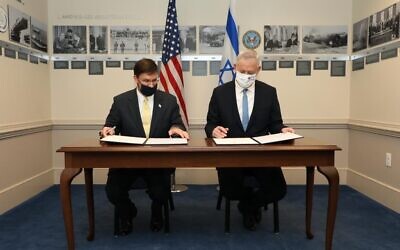

US defense secretary signs agreement to honor existing commitment to Jewish state’s military superiority amid concerns over sale of F-35 fighter jets to UAE.
Defense Minister Benny Gantz hailed an agreement signed with the Pentagon on Thursday to safeguard Israel’s military superiority in the region as representing a “major leap forward” for Israel’s security interests.
Gantz on Wednesday night traveled to Washington for meetings with US defense officials — notably Secretary of Defense Mark Esper — largely focused on Israeli concerns over a proposed sale of F-35 fighter jets and other advanced weaponry to the United Arab Emirates. Israel has expressed concerns over the potential impact this could have on Israel’s military superiority in the region, known formally as its qualitative military edge, which the US is legally obligated to maintain under a 2008 law.
Though officials involved in the matter maintain that the agreement to provide the F-35 stealth fighter jet to the UAE was not directly tied to Abu Dhabi’s normalization of ties with Israel, American officials have definitively indicated that the deal with Jerusalem paved the way to the arms sale, which is expected to include not only the F-35 but also advanced drones.
It was not known if Gantz had agreed to pull concerns over the sale or made any other concessions in exchange for the new US commitment.
Though this appeared to be a largely symbolic gesture as this responsibility is already enshrined in US law, the defense minister said in a statement that it does have real-world implications.
“This declaration of course has practical measures — and this isn’t the place to expand on them — but I can say this: The security of Israel has made a major leap forward,” Gantz wrote on Twitter.
A senior Israeli defense official, speaking on condition of anonymity after the signing, told reporters that the document signed on Thursday was a general commitment by the US to maintain Israel’s military superiority but that discussions were ongoing over which specific weapons and systems that Washington would provide Jerusalem to offset the sale of the F-35 to the UAE and other weapons to other countries in the region going forward.
“This is not the end of the story,” said the official, who was deeply familiar with the discussions. He added that the specifics of “what we are getting and what we aren’t getting and what they’ll sell us later” would be determined in future discussions.
Asked specifically about the possibility of Israel acquiring the V-22 Osprey, a tiltrotor aircraft that effectively can act as both a helicopter and an airplane, the senior defense official confirmed that the matter was indeed being considered, after it was dismissed by Israel in years past due to its high cost and narrow range of uses compared to other aircraft.
The official said he expected there to be additional normalization agreements between Israel and other Arab and Muslim countries in the future and that these would likely be accompanied by US agreement to sell them advanced weapon systems.
“There are countries in the region with lots of money who want to upgrade their militaries, and the US has an interest to sell [them] weapons,” he said.
A defense official quoted by multiple Herbew media outlets also said that he expected “Sudan, and later Saudi Arabia, to come out of the closet” regarding official ties with Israel.
The first official dismissed the notion that this joint declaration was a trivial gesture as it confirmed what is already US law and was before then bipartisan policy for decades, saying the fact that it was reiterated on Thursday by Esper and his staff was of “not insignificant importance.”

Mark Esper sign a joint statement in the Pentagon on October 22, 2020.
(Shmulik Almani/Defense Ministry)
He said the signing of this declaration was a boon for Israel’s national security.
“We are in a good place,” he said. “I am very relaxed.”
At the signing ceremony, Gantz said Israel was now better situated to confront Iran in the Middle East in light of its normalized ties with the UAE and Bahrain and its hopes to formalize relations with others, notably Sudan, with whom Jerusalem was reportedly in advanced stages of negotiations as of Thursday night.
“Now that we are entering an era of positive normalization processes in the Middle East, which actually can face an aggressive Iran across the region, this ability of continued cooperation is so very important,” Gantz said.
This was Gantz’s second visit to Washington in the past month, both times focusing on the potential ramifications of the F-35 sale, which the Trump Administration was apparently determined to finalize quickly.
“Indeed over the last few weeks, you and I led, together with other people, very good and very important discussions that reassure the bi-partisan commitment to Israel’s QME. I want to thank you and your people, and the American Administration, for supporting it,” Gantz said.
“It was important for me once again to reaffirm the special relationship between our two countries, the commitment we have made to Israel’s security based on our shared values, our shared history, and I want to thank you for your personal efforts in the past few weeks,” Esper said.
Gantz planned to return to Israel on Friday, according to his office.
According to a Reuters report last month, the US was hoping to ink a deal to sell the stealth fighters to the UAE by December, but is also looking for ways to assuage Israel’s concerns that its security could be jeopardized by the sale of the advanced jets.


Air Base in the United Arab Emirates, August 5, 2019. (Staff Sgt. Chris
Thornbury/US Air Force via AP)
The sale of the state-of-the-art F-35 fighter jet could be offset by either providing the Emiratis with a less capable form of the aircraft or by selling Israel yet more powerful systems.
These included fighter jets, helicopters and various air defense batteries, among other military systems, the official said.
Gantz has previously expressed opposition to the sale of the F-35s to the UAE, though he has also noted that the choice is ultimately up to the US.
While Israeli opposition could complicate a US arms sale, Jerusalem does not have an actual veto over American arms deals.
(Times of Israel).





